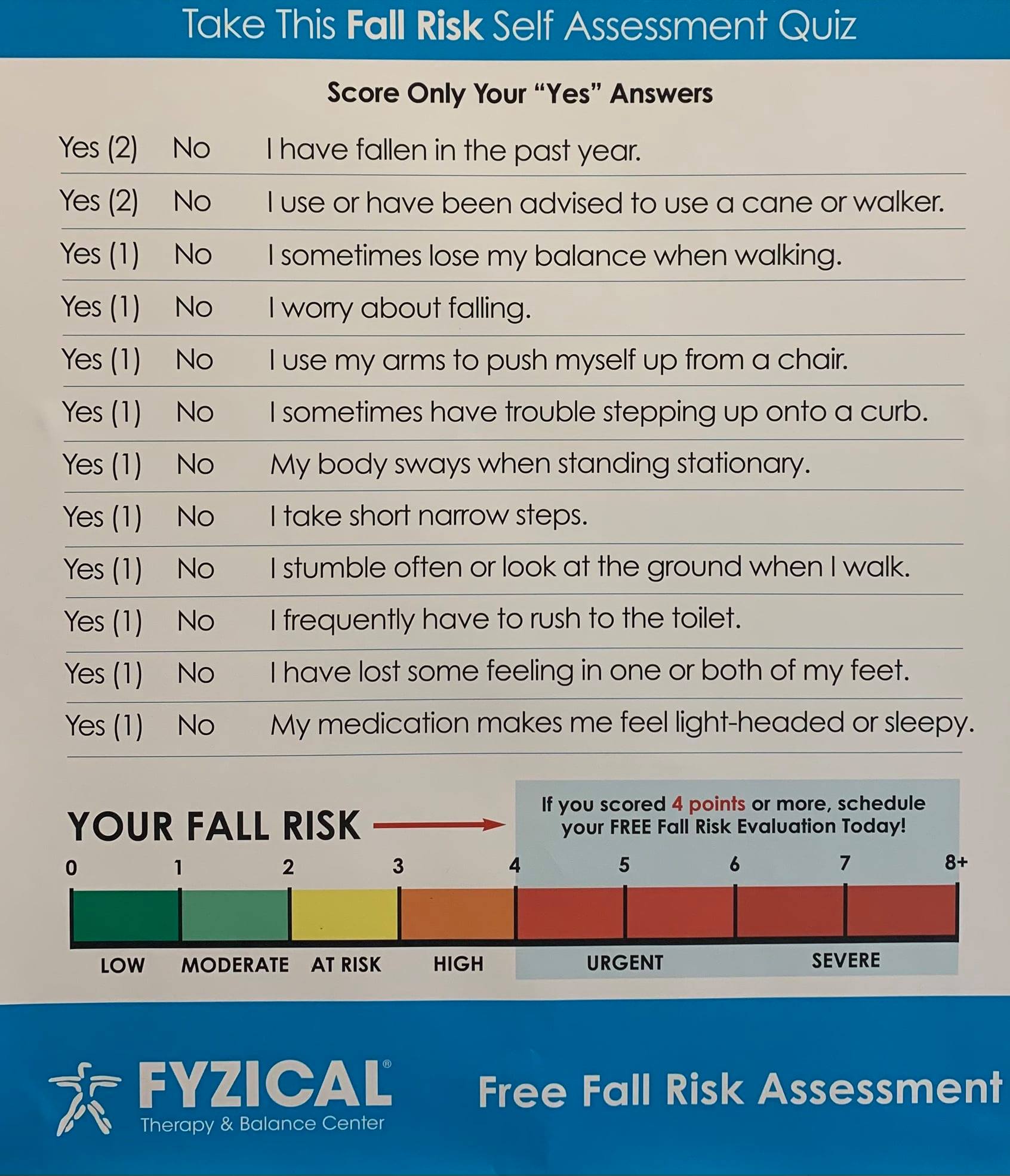6 Easy Facts About Dementia Fall Risk Explained
6 Easy Facts About Dementia Fall Risk Explained
Blog Article
Everything about Dementia Fall Risk
Table of ContentsThe 25-Second Trick For Dementia Fall RiskSome Known Factual Statements About Dementia Fall Risk Little Known Facts About Dementia Fall Risk.Some Known Details About Dementia Fall Risk Excitement About Dementia Fall Risk
Guarantee that there is a marked location in your medical charting system where team can document/reference ratings and record relevant notes connected to fall avoidance. The Johns Hopkins Autumn Danger Assessment Device is one of several tools your team can use to aid stop damaging clinical occasions.Individual falls in medical facilities are common and debilitating negative events that persist regardless of decades of initiative to lessen them. Improving communication across the examining registered nurse, care group, patient, and individual's most involved loved ones may reinforce fall prevention initiatives. A team at Brigham and Women's Hospital in Boston, Massachusetts, looked for to develop a standard fall avoidance program that focused around improved interaction and patient and household involvement.

The innovation team highlighted that effective implementation depends upon patient and personnel buy-in, assimilation of the program into existing process, and integrity to program processes. The team kept in mind that they are grappling with exactly how to make certain continuity in program implementation during durations of situation. During the COVID-19 pandemic, for example, a boost in inpatient drops was connected with restrictions in individual engagement together with constraints on visitation.
Not known Details About Dementia Fall Risk
These occurrences are generally considered avoidable. To apply the treatment, companies need the following: Access to Fall suggestions resources Autumn suggestions training and re-training for nursing and non-nursing team, including new nurses Nursing workflows that enable for individual and household involvement to conduct the drops analysis, make certain usage of the avoidance strategy, and conduct patient-level audits.
The results can be very damaging, usually increasing individual decline and creating longer hospital keeps. One research study estimated keeps boosted an extra 12 in-patient days after a client loss. The Loss TIPS Program is based on engaging individuals and their family/loved ones throughout three major procedures: assessment, customized preventative interventions, and bookkeeping to make sure that patients are involved in the three-step fall avoidance process.
The individual assessment is based upon the Morse Fall Range, which is a validated autumn risk evaluation device for in-patient health center setups. The range consists of the six most usual factors individuals in health centers drop: the client autumn history, high-risk conditions (consisting of polypharmacy), use of IVs and other exterior gadgets, mental standing, gait, and flexibility.
Each danger aspect links with several workable evidence-based interventions. The nurse develops a plan that incorporates the treatments and shows up to the care team, person, and household on a laminated poster or published aesthetic aid. Nurses create the strategy while meeting the individual and the person's household.
The Only Guide to Dementia Fall Risk
The poster acts as an interaction tool with other members of the patient's treatment team. Dementia Fall Risk. The audit component of the program includes examining the individual's understanding of their risk factors and avoidance strategy at the system and health center degrees. Nurse champions perform a minimum of 5 private interviews a month with patients and their family members to look for understanding of the autumn prevention plan

A projected 30% of these falls outcome in injuries, which can range in severity. Unlike various other damaging occasions that require a standardized clinical response, autumn avoidance depends extremely on the needs of the client.
The 2-Minute Rule for Dementia Fall Risk

Based on auditing outcomes, one site had 86% compliance and two sites had over 95% conformity. A cost-benefit analysis of the Fall suggestions program in 8 hospitals approximated that the program cost $0.88 per individual to execute and led to financial savings of $8,500 per 1000 patient-days in straight costs associated with the avoidance of 567 drops over 3 years and 8 months.
According to the technology group, organizations curious about executing the program ought to perform a preparedness assessment and drops prevention spaces evaluation. 8 Furthermore, organizations need to make certain the essential framework and process for implementation and establish an execution plan. If one exists, the organization's Fall Prevention Task Pressure need to be associated with preparation.
7 Easy Facts About Dementia Fall Risk Described
To start, use this link organizations should guarantee conclusion of training components by nurses and nursing assistants - Dementia Fall Risk. Medical facility staff need to examine, based on the needs of a hospital, whether to make use of a digital health and wellness record printout or paper version of the loss prevention plan. Implementing groups must hire and train nurse champs and develop processes for bookkeeping and reporting on fall data
Staff require to be associated with the procedure of redesigning the operations to engage people and household in the analysis and prevention strategy procedure. Systems must be in location so that devices can comprehend why a loss her response happened and remediate the cause. A lot more specifically, registered nurses should have networks to supply ongoing comments to both staff and device leadership so they can adjust and boost loss prevention process and communicate systemic problems.
Report this page